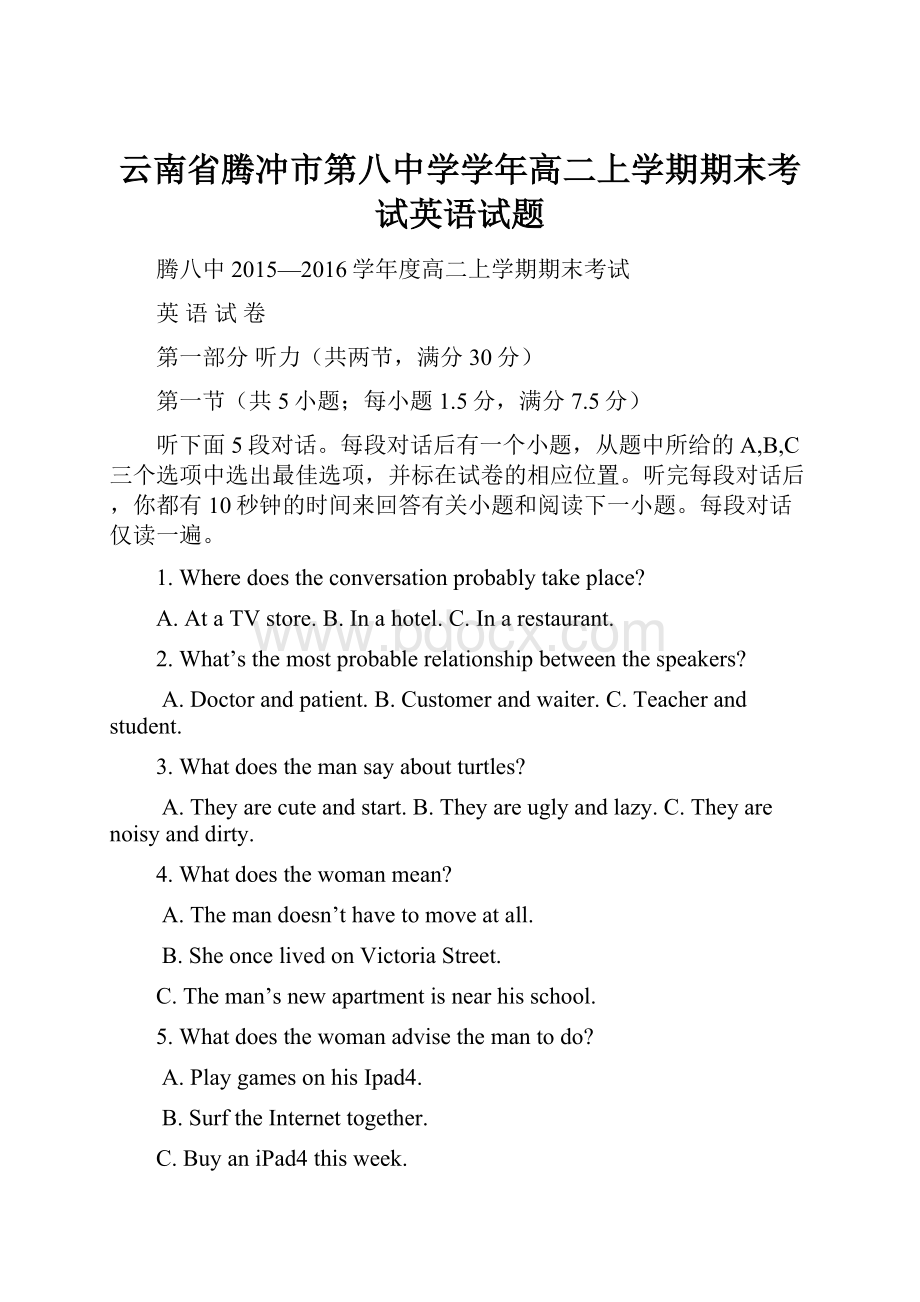云南省腾冲市第八中学学年高二上学期期末考试英语试题.docx
《云南省腾冲市第八中学学年高二上学期期末考试英语试题.docx》由会员分享,可在线阅读,更多相关《云南省腾冲市第八中学学年高二上学期期末考试英语试题.docx(16页珍藏版)》请在冰豆网上搜索。

云南省腾冲市第八中学学年高二上学期期末考试英语试题
腾八中2015—2016学年度高二上学期期末考试
英语试卷
第一部分听力(共两节,满分30分)
第一节(共5小题;每小题1.5分,满分7.5分)
听下面5段对话。
每段对话后有一个小题,从题中所给的A,B,C三个选项中选出最佳选项,并标在试卷的相应位置。
听完每段对话后,你都有10秒钟的时间来回答有关小题和阅读下一小题。
每段对话仅读一遍。
1.Wheredoestheconversationprobablytakeplace?
A.AtaTVstore.B.Inahotel.C.Inarestaurant.
2.What’sthemostprobablerelationshipbetweenthespeakers?
A.Doctorandpatient.B.Customerandwaiter.C.Teacherandstudent.
3.Whatdoesthemansayaboutturtles?
A.Theyarecuteandstart.B.Theyareuglyandlazy.C.Theyarenoisyanddirty.
4.Whatdoesthewomanmean?
A.Themandoesn’thavetomoveatall.
B.SheoncelivedonVictoriaStreet.
C.Theman’snewapartmentisnearhisschool.
5.Whatdoesthewomanadvisethemantodo?
A.PlaygamesonhisIpad4.
B.SurftheInternettogether.
C.BuyaniPad4thisweek.
第二节(共15小题;每小题1.5分,满分22.5分)
请听下面5段对话或独白。
每段对话或独白后有几个小题,从题中所给的A,B,C三个选项中选出最佳选项,并标在试卷的相应位置。
听每段对话或独白前,你将有时间阅读各个小题,每小题5秒钟;听完后,每小题将给出5秒钟的作答时间。
每段对话或独白读两遍。
听第6段材料,回答第6、7题。
6.WhyisthewomanintheUnitedStatesthistime?
A.Tovisitherfriends.B.Tohaveaholiday.C.Todosomebusiness.
7.Whichofthefollowinghasthewomanplannedwell?
A.Thehotelsshewillstay.B.Therouteofhertrip.C.Thedateshewillreturn.
听第7段材料,回答第8、9题.
8.Howlongdidthemanworkintheradiofactory?
A.Forthreemonths.B.Foronemonth.C.Fortwomonths.
9.Whydoesthemanwanttoworkinthewoman’scompany?
A.Itisthecompany’sbusyseason.
B.Hecanmakealotofmoney.
C.Hewantstobecomeaskilledengineer.
听第8段材料,回答第10至12题.
10.Whatdoweknowabouttheman?
A.Heismarried.B.Hehasafour-dayvacation.C.Hetookatriplastsummer.
11.Whywon’tthemangotoAustraliabyship?
A.Hedoesn’thaveenoughtime.
B.Hehasbookedtheplanetickets.
C.Goingbyshipisn’trelaxing.
12.Whatdoesthemanwanttovisitmost?
A.GoldenBeach.B.WaveRock.C.TheGreatOceanRoad.
听第9段材料,回答第13至16题.
13.Howlonghasthemanbeenfeelingill?
A.Aboutthreeorfourdays.
B.Aboutfiveorsixdays.
C.Abouttwoorthreedays.
14.Whendidthemangiveupsmokingforthefirsttime?
A.Threeyearsago.B.Twoyearsago.C.Oneyearago.
15.Whatdidthemandothismorning?
A.Hetooksomecoughmedicine.
B.Hehadsomelemonjuice.
C.Hetookhistemperature.
16.Howmanycapsulesshouldthemantakeeachday?
A.3B.5C.8
听第10段材料,回答第17至20题.
17.Whenwerethethreefishermenprobablyrescued?
A.InJanuary.B.InAugust.C.InJune.
18.Howdidthethreefishermenmanagetosurvive?
A.Byeatinganimalstheycaught.
B.Byeatingdriedfoodtheyhadbrought.
C.Byeatingfishboiledinwater.
19.Howwerethethreefishermenwhentheywererescued?
A.Theyweredesperateabouttheirfuture.
B.Theywereinpoorhealthbutingoodspirits.
C.Theywereveryfrightened.
20.Whatcanwelearnfromthetalk?
A.Theboatthethreefishermentookwas25feetlong.
B.AKiribatifishingboatfoundthethreefishermen.
C.Thethreefishermenwereblown5,000kilometersoffcourse.
第二部分阅读理解(共20小题;每小题2分,满分40分)
第一节:
.阅读下列短文,从每题所给的四个选项(A、B、C和D)中,选出最佳选项.
A
Long,longago,therelivedaprofessorofmedicine,whowasverystrictwithhisstudents.Wheneverhetookthechairontheexamcommittee,thestudentswouldbeinfear,becausehewasseldompleasedwiththeanswerstheygave.Astudentwouldbeluckyenoughifheorshecouldreceiveagoodmarkfromhim.Attheendoftheterm,thestudentsofmedicinewouldtaketheirexamagain.Nowastudententeredtheexamroomandsatbeforethecommittee.Thisstudentwasalittlenervousasheknewitwouldnotbesoeasytogetthroughtheexamatall.
Theprofessorbegantoask.ThestudentwasaskedtodescribeacertainillnessandhisdescriptionwasOK.
Thentheprofessoraskedaboutthecurefortheillness,andthestudent,too,answeredjustasright.
“Good,”saidtheprofessor,“andhowmuchwillyougivethepatient?
”
“Afullspoon.”Answeredthestudent.
“Nowyoumaygooutandwaitforwhatyoucanget,”saidtheprofessor.Atthesametime,thecommitteediscussedcarefullytheanswersthestudenthadgiven.Suddenlythestudentnoticedthattherewassomethingwrongwithhislastanswer.“Afullspoonistoomuch,”hethoughttohimself.Anxiouslyheopenedthedooroftheroomandcried,“Mr.Professor,I’vemadeamistake!
Afullspoonistoomuchforthepatient.Hecantakeonlyfivedrops.”
“I’msorry,sir,”saidtheprofessorcoldly,“Butit’stoolate.Yourpatienthasdied.”
21.Thestudentswereafraidoftheprofessorbecause.
A.theiranswersseldomsatisfiedhim.
B.theyoftenangeredanddisappointedhim.
C.theiranswersoftenastonishedhim.
D.heoftenmisunderstoodthemandgivethembadmarks.
22.Thestudent’sdescriptionoftheillnesswas.
A.notcorrect.
B.notsatisfying.
C.accepted.
D.completelydiscouraging.
23.Beforehelefttheroom,thestudentwasalmostsurethat.
A.hislastanswerwassatisfying.
B.hehadmadeamistake.
C.hehadnotdonewellintheexam’.
D.hehadpassedtheexam,andtheonlythingwastowaitforthemark.
24.WhichofthefollowingisNOTtrue?
A.Thepatientwillbeindangerifhe’stakenasmuchasafullspoon.
B.Sinceonespoonislessthanfivedrops,thepatientwillbeallrightsoon
ifhetakesonlyonefullspoonatatime.
C.Thedoctorwillbeintroubleifhe’sgiventhepatientafullspoon.
D.Ifthepatientwantstoremainsafe,heshouldtakenomorethanfivedrops
atatime.
B
MakeachoiceofyourOne-DayTours
TourA—Bath&StonehengeincludingentrancefeestotheancientRomanbathroomsandStonehenge--£37until26Marchand£39afterthat.
Visitthecitywithover2,000yearsofhistoryandBathAbbey,theRoyalCrescentandtheCostumeMuseum.Stone-hengeisoneoftheworld’smostfamousprehistoricmonumentsdatingbackover5,000years.
TourB—Oxford&StratfordincludingentrancefeestotheUniversityStMary’sChurchTowerandAnnHathaway’shouse--£32until12Marchand£36afterthat.
Oxford:
IncludesaguidedtourofEngland’soldestuniversitycityandcolleges.Lookoverthe“cityofdreamingspires(尖端)”fromStMary’sChurchTower.
Stratford:
IncludesaguidedtourexploringmuchoftheShakespearewonder.
TourC--WindsorCastle&HamptonCourtincludingentrancefeestoHamptonCourtPalace--£34until11Marchand£37afterthat.
IncludesaguidedtourofWindsorandHamptonCourt,HenryVIII’sfavouritepalace.FreetimetovisitWindsorCastle(entrancefeesnotincluded).With500yearsofhistory,HamptonCourtwasoncethehomeoffourKingsandoneQueen.Nowthisformerroyalpalaceisopentothepublicasamajortouristattraction.Visitthepalaceanditsvarioushistoricgardens,whichincludethefamousmaze(迷宫)whereiteasytogetlost!
TourD–CambridgeincludingentrancefeestotheTowerofSaintMarytheGreat--£33until18Marchand£37afterthat.
IncludesaguidedtourofCambridge,thefamousuniversitytown,andthegardensofthe18century.
25.WhichtourwillyouchooseifyouwanttoseeEngland’soldestUniversitycity?
A.TourBB.TourAC.TourCD.TourD
26.Whichofthefollowingtourschargesthelowestfeeon17March ?
A.WindsorCastle&HamptonCourt.
B.Oxford&Stratford.
C.Cambridge.
D.Bath&Stonehenge.
27.WhyisHamptonCourtamajortouristattraction?
A.Itusedtobeawell-knownmaze.
B.ItistheoldestpalaceinBritain.
C.Itisaworld-famouscastle.
D.Itusedtobethehomeofroyalfamilies.
C
InourmodernsocietyasmoreandmorepeoplebecomemoredependentontheInternettostoreinformation,arepeoplerememberingless?
Ifyouknowyourcomputerwillsaveinformation,whystoreitinyourownpersonalmemory,yourbrain?
ExpertsarewonderingiftheInternetischangingwhatwerememberandhow.
Inarecentstudy,ProfessorBetaySparrowconductedsomeexperiments.SheandherresearchteamwantedtoknowhowtheInternetischangingmemory.Inthefirstexperiment,theygavepeople40unimportantfactstotypeintoacomputer.Thefirstgroupofpeopleunderstoodthatthecomputerwouldsavetheinformation.Thesecondgroupunderstoodthatthecomputerwouldnotsaveit.Later,thesecondgrouprememberedtheinformationbetter.Peopleinthefirstgroupknewtheycouldfindtheinformationagain,sotheydidnottrytorememberit.
Inanotherexperiment,theresearchersgavepeoplefactstoremember,andtoldthemwheretofindtheinformationonthecomputer.Theinformationwasinaspecificcomputerfolder(文件夹).Surprisingly,peoplelaterrememberedthefolderlocation(位置)betterthanthefacts.WhenpeopleusetheInternet,theydonotremembertheinformation.Rather,theyrememberhowtofindit.Thisiscalled“transactivememory(交互记忆).”
AccordingtoSparrow,wearenotbecomingpeoplewithpoormemoriesasaresultoftheInternet.Instead,computerusersaredevelopingstrongertransactivememories;thatis,peoplearelearninghowtoorganizehugequantitiesofinformationsothattheyareabletoaccessitatalaterdate.Thisdoesn’tmeanwearebecomingeithermoreorlessintelligent,butthereisnodoubtthatthewayweusememoryischanging.
28.Thepassagebeginswithtwoquestionsto.
A.showtheauthor’sattitudeB.introducethemaintopic
C.describehowtousetheInternetD.explainhowtostoreinformation
29.Whatcanwelearnaboutthefirstexperiment?
A.TheSparrow’steamtypedtheinformationintoacomputer.
B.Thefirstgroupdidnottrytoremembertheinformation.
C.Thetwogroupsrememberedtheinformationequallywell.
D.Thesecondgroupdidnotunderstandtheinformation.
30.Intr